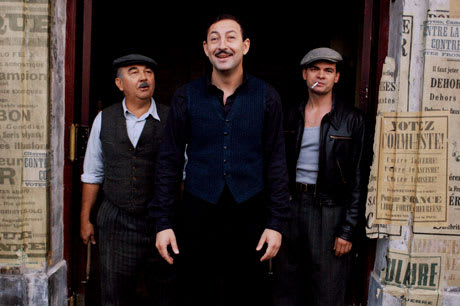Hailing from France, as one might be able to deduce from the title, Faubourg 36 (or Paris 36, as it is known in English) is Christophe Barratiers second feature film and follow-up to his international debut, Les Choristes.
While his first feature was brazenly honest, direct and unexpectedly hopeful, Faubourg 36 is decidedly theatrical, which is appropriate considering its setting in a dying Parisian theatre. The vaudevillian players that run the show and weave in and out of corridors and dressing rooms know this space as if it were their home. They also fight for it as though as if it was such when it is shut down just before the start of WWII. Actors dont fight with guns though: they fight with words and songs and laughter.
In order to save their jobs and livelihood, a trio of amateurs (Gerard Jugnot, Clovis Cornillac and Kad Merad) do the only thing they know how to: put on a show. Barratier exerts a strong command of his extravagant picture, balancing delicately between the romanticism and idealism of realizing your dreams and the hardships and tension felt amongst the Parisian people during the trying time.
My only true complaint is that the main plot is bookended by a murder that adds nothing and is far less interesting than the formal plight. When the storyline actually returns, its almost entirely forgotten; it is as though the show comes back for one too many encores.
Still, the earnest and sensitive performances, including the appropriately soft yet captivating turn by relative newcomer Nora Arnezeder as star chanteuse Douce, are a joy to delight in.
By going behind the curtains and throwing the whole chaotic experience centre stage, Barratier has created a film about a show that is just as much fun to sit through as the production within the film is for the actors.
(Alliance)While his first feature was brazenly honest, direct and unexpectedly hopeful, Faubourg 36 is decidedly theatrical, which is appropriate considering its setting in a dying Parisian theatre. The vaudevillian players that run the show and weave in and out of corridors and dressing rooms know this space as if it were their home. They also fight for it as though as if it was such when it is shut down just before the start of WWII. Actors dont fight with guns though: they fight with words and songs and laughter.
In order to save their jobs and livelihood, a trio of amateurs (Gerard Jugnot, Clovis Cornillac and Kad Merad) do the only thing they know how to: put on a show. Barratier exerts a strong command of his extravagant picture, balancing delicately between the romanticism and idealism of realizing your dreams and the hardships and tension felt amongst the Parisian people during the trying time.
My only true complaint is that the main plot is bookended by a murder that adds nothing and is far less interesting than the formal plight. When the storyline actually returns, its almost entirely forgotten; it is as though the show comes back for one too many encores.
Still, the earnest and sensitive performances, including the appropriately soft yet captivating turn by relative newcomer Nora Arnezeder as star chanteuse Douce, are a joy to delight in.
By going behind the curtains and throwing the whole chaotic experience centre stage, Barratier has created a film about a show that is just as much fun to sit through as the production within the film is for the actors.
